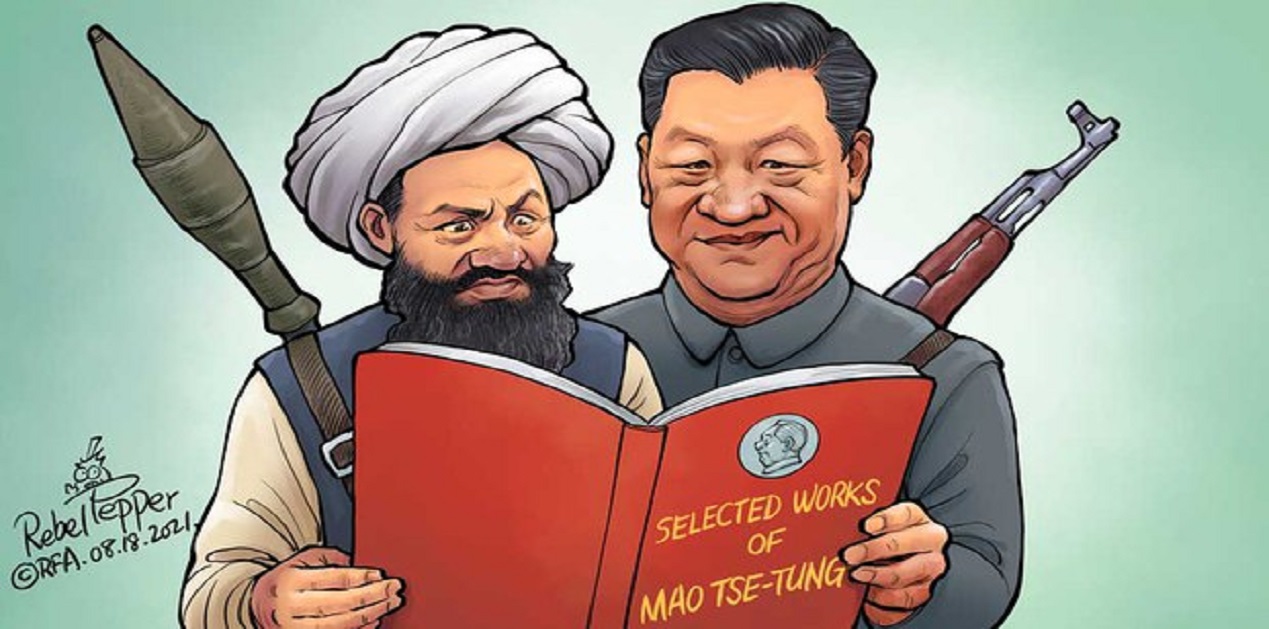The lightning speed with which the Taliban took over Afghanistan on August 15, 2021, has enthralled the experts around the globe.1 There are lot of speculations that are taking place, on what went wrong and how even after twenty years of rigorous military operations and spending billions of dollars, the ‘War on Terror’ ended so ignominiously.
While the NATO members were planning the withdrawal of the troops from Afghanistan, it was observed that China had increased its presence surreptitiously. Soon after the Taliban took over Kabul by a storm, China did not hesitate and the spokesperson for China’s Foreign Ministry said Beijing is “ready to develop good-neighbourliness and friendly cooperation” with Afghanistan.2
This romancing between China and the Taliban has a significant impact on the region with the probability of Great Game 2.0. It is pertinent to discuss China’s interests in Afghanistan and the future roadmap for the same.
China’s interests are governed by three strategic objectives, these are:
-
Replacing US in the Game of Geopolitics
-
Expanding the area of influence in the region and stability of its dream project Belt and Road Initiative
-
Restraining the Uygur militants in the Afghanistan Pakistan border region
Firstly, China has always been competing with the United States at the global level. Similarly, Beijing’s impulse to replace the US in Afghanistan is a part of the US- China rivalry at the global level. Secondly, China’s own insecurities forced it to enter Kabul not only for developmental projects but also to counter the perceived threats. Finally, another unsaid but obvious reason is India China competition in the South Asian region.
Due to better connectivity via the Central Asian Region (CAR), the bilateral air corridors, the trade and economic dependence of Afghanistan on China are likely to increase.3 The Afghan Transit Terminal (ATT) at Gwadar established by China4 is aimed at undermining India’s efforts for developing the Chabahar route via Afghanistan.5 Further, the Wakhan Corridor shares around 106 km boundary with Pakistan Occupied Kashmir region which is particularly of strategic importance for China.
It is clear that for China, Afghanistan is more of a challenge than an opportunity. Beijing is wary of three challenges which is keeping them on guard; these are- theocratic regime under the Taliban, religious extremism and jihadism aka terrorism.
China plans to connect Asia with Africa and Europe via land and maritime networks spanning 60 countries as part of its BRI strategy.6 The strategy would not only promote inter-regional connectivity, but would also increase China’s global influence.
For this purpose, Afghanistan is a key nation which provides China a strategic geopolitical footprint in Central and South Asia, giving it immense leverage in the region.
Afghanistan lies between two major Belt and Road Initiative (BRI) projects, namely China Pakistan Economic Corridor (CPEC) and the China Central and West Asia Economic Corridor (CCWAEC). It is also part of the Five Nation Railway Project from China to Iran through Kyrgyzstan, Tajikistan and Afghanistan.7 Therefore, it is evident that unstable Afghanistan would be detrimental to the success of these essential connectivity projects in China. Beijing has also engaged Afghanistan through the Quadrilateral Cooperation and Coordination Mechanism (QCCM) comprising of China, Afghanistan, Pakistan and Tajikistan.8
China’s security concern is due to the shared boundary in the Wakhan corridor and the Xinjiang province. The East Turkmenistan Islamic Party (ETIM) and Turkmenistan Islamic Party (TIP) are the two Uyghur separatist groups which can anytime challenge Beijing’s conduct with the Uyghur minority community. As per the UN report Abdul Haq al-Turkistani,9 the Turkestan Islamic Party’s leader, is trying to create a channel to move Uyghurs in Syria’s Idlib province to Afghanistan.10
The Baloch and Sindhi separatist groups in Pakistan are already attacking Chinese nationals and investments for exploiting their resources through the China-Pakistan Economic Corridor.11 In May, the Tehreek-e-Taliban Pakistan (TTP) targeted the Serena Hotel in a suicide attack in Quetta, where the Chinese ambassador was staying.12
Likewise, an influential jihadist and anti-China firebrand Abu Zar al-Burmi member of TTP has been challenging China. He has been vocal at many occasions about how China is the next enemy of Ummah after the US.13 Jihadist groups need a big enemy to justify their extremist narratives and violence. With the US exit from Afghanistan, China might just become that enemy.
China an Influential Player in the Region
Given the strategic interests of China in the region, it is evident that an unstable Afghanistan will be detrimental to Beijing’s investment worth billions of dollars. With the fall of Kabul and withdrawal of embassies from the Afghanistan, China is one of the few countries which have ensured continuance of their diplomacy with the Taliban.
Previously, in June 2019, China engaged with the Taliban directly, Taliban representatives have visited Beijing in June 2019 and September 2019 after the US-Taliban talks broke down in Doha. In their backchannel contacts, China has extracted guarantees from the Taliban not to allow Afghanistan to become a ground for Uygur militants’ anti-China activities, to protect Chinese investments and bring peace to the country. In return, Beijing has gone to the extent of offering Taliban investment in roads and in future; it will also invest in energy projects generating electricity and then transporting oil and gas from central Asia via Afghanistan.14 At the same time the Taliban has on several occasions assured security to the Chinese investors in Afghanistan.
Apart from invest projects, Beijing is also involved in several soft power diplomacy projects like assistance in the construction of a National Vocational Training Centre in Kabul, aid in construction of two buildings in Kabul University and Scholarship to Afghan scholars to study in China to name a few.
China is unlikely to put boots on the ground, knowing the fate of the earlier Russian and American interventions. Despite all this, if Beijing stills decides to play a role of peacekeeping in Afghanistan, it will adopt a multilateral approach by involving the United Nations or the Shanghai Cooperation Organisation (SCO).
China will further use its geo-economic strength in the region to motivate the Taliban to give up violence. Further, it will secure the involvement of Pakistan, which has influence over the Taliban, to secure its interests.
Conclusion
Chinese diplomacy in Afghanistan is based on too many hopes and tricky situations which have yet not passed the test of the time. There are many questions which are yet not answered by the Taliban, however, Beijing has given its support in principle to the Mullah Baradar team. But at the same time Beijing also avows to a policy of non-interference in the internal affairs of other countries. How you want to rule your country is largely your own business, just don't let that affect China," said Lin Minwang, a South Asia expert with Shanghai's Fudan University.15
Chinese Foreign Ministry has not yet recognized the Taliban regime and is open to support them once they form a government.16 As the future structure of peace in Afghanistan is uncertain, to hedge its risks, China is likely to continue engaging with the Taliban. China is playing a balancing role between Pakistan and Afghanistan on issues like support to the Taliban and access to CPEC.
Even though the Taliban promises to have an “inclusive” government which will have respect for women, children and masses in general, in last one week of them taking over Kabul, there has been mention of the term “sharia” and “Islamic Traditions”; it is obvious that it is a tough road ahead for the people of Afghanistan.
End Notes
- Swailsn Ward and Kottasova, Calm and Fear on the Streets of Kabul as jubilant Taliban celebrate their victory, at CNN Word, August 16, 2021, https://edition.cnn.com/2021/08/16/middleeast/kabul-streets-taliban-regime-intl/index.html (Accessed August 16, 2021).
- Abigail Ng, ‘Hedging their bets’: Political Experts Weigh in on China’s growing relations with the Taliban’, at CNBC, August 23, 2021,https://www.cnbc.com/2021/08/23/china-and-taliban-relations-with-afghanistan-are-tricky-analysts-say.html (Accessed August 23, 2021).
- Srdjan Uljevic, ‘China’s Central Asia Strategy in the age of ‘extremis competition’, at Eurasianet, March 29, 2021, https://eurasianet.org/perspectives-chinas-central-asia-strategy-in-the-age-of-extreme-competition (Accessed August 20, 2021).
- ‘Gwadar Port Welcomes First Afghan Transit Trade Cargo’, at CEPECInfo.com, January 15, 2020, http://cpecinfo.com/gwadar-port-welcomes-first-afghan-transit-trade-cargo/ (Accessed August 20, 2021).
- Subhash Singh, ‘India’s Chabahar Policy: Implications for China-Pakistan Cooperation’, International Journal of Applied Social Science, Vol 4 (5&6), May & June (2017), pp. 172-182.
- Polina Tikhonov, ‘China prepares to move into Afghanistan with $62 billion ‘Belt and Road’ initiative as American troops leave’, at Insider Paper, July 9, 2021, https://insiderpaper.com/china-belt-and-road-afghanistan-us-forces-leave/ (Accessed August 23, 2021).
- Bibhu Routray and Sayantan Haldar, ‘Five Nations Railway Corridor Project: Increasing Connectivity & Chinese Dominance in Afghanistan’, at Mantraya Analysis, April 27, 2018, http://mantraya.org/analysis-five-nations-railway-corridor-project-increasing-connectivity-and-chinese-dominance-in-afghanistan/ (Accessed August 23, 2021).
- ‘China’s National Defense in the New Era’, The State Council Information Office of
the People's Republic of China, July 2019, http://www.china-un.ch/eng/dbtyw/cjjk_1/cjjzzdh/t1683060.htm (Accessed August 23, 2021). - Thomas Josceyln and Caleb Weiss, ‘Turkistan Islamic Party Head Decries Chinese Occupation’, at FDD ‘s Long WarJournal, March 18, 2019, https://www.longwarjournal.org/archives/2019/03/turkistan-islamic-party-head-decries-chinese-occupation.php (Accessed August 23, 2021).
- Thomas Josceyln and Caleb Weiss, ‘Turkistan Islamic Party Leader Criticizes the Islamic State’s ‘illegitimate’ caliphate’, at FDDs Long War Journal,March 18, 2019, https://www.longwarjournal.org/archives/2019/03/turkistan-islamic-party-head-decries-chinese-occupation.php (Accessed August 23, 2021).
- ‘Attack on Chinese Nationals: BLA claims responsibility, China presses Pakistan for effective measures’, at The Balochistan Post, August 21, 2021, https://thebalochistanpost.net/2021/08/attack-on-chinese-nationals-bla-claims-responsibility-china-presses-pakistan-for-effective-measures/(Accessed August 21, 2021).
- ‘Pakistan hotel bomb: Deadly Blast hits luxury venue in Quetta’, at BBC News, April 22, 2021, https://www.bbc.com/news/world-asia-56834937(Accessed August 21, 2021).
- Lucas Webber ‘Abu Zar al-Burmi: Jihadi Cleric and Anti-China Firebrand’, at Small Wars Journal, April 6, 2021, https://smallwarsjournal.com/jrnl/art/abu-zar-al-burmi-jihadi-cleric-and-anti-china-firebrand (Accessed August 22, 2021).
- Ibd. No 6
- Yew Lun Tian, ‘Analysis: As Taliban Advances, China lays groundwork to accept an awkward reality’, at Reuters, August 16, 2021, https://www.reuters.com/world/china/taliban-advances-china-lays-groundwork-accept-an-awkward-reality-2021-08-14/ (Accessed 17, 2021).
- Ananth Krishnan, ‘China won’t recognize Taliban Until government formation’, at The Hindu, August 18, 2021, https://www.thehindu.com/news/international/china-wont-recognise-taliban-until-government-formation/article35985851.ece’ (Accessed August 18 ,2021).
(The paper is the author’s individual scholastic articulation. The author certifies that the article/paper is original in content, unpublished and it has not been submitted for publication/web upload elsewhere, and that the facts and figures quoted are duly referenced, as needed, and are believed to be correct). (The paper does not necessarily represent the organisational stance... More >>
Image Source: https://www.rfa.org/english/cartoons/taliban-china-cartoon-08182021113619.html/@@images/d33027a8-cb7a-4e5d-8b3a-15d20ed57faf.jpeg











Post new comment